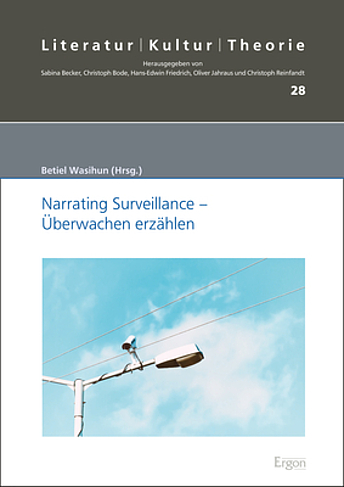englischIn a time when observation technologies, corporate surveillance and facial recognition are ubiquitous, a critical examination of surveillance has become more urgent than ever, as digital totalitarianism puts privacy and personal freedom at risk. Representations of surveillance in literature, film and popular culture in general play not only a decisive role in determining our understanding of its scope but also help us to better grasp the complexity of it as a phenomenon. Because narrators are observers by nature, observation techniques in literature and film show analogies to forms and practices of surveillance. But are narrative instances also instances of surveillance and control? And how is surveillance narrated anyway? How do narratives contribute to a critique of surveillance practices? Have both surveillance technologies and theories of surveillance informed the narrative situations in contemporary literature and film? These questions are at the heart of this collection of essays which critically approaches the complex relationship between surveillance and narrative from various literary, filmic and cultural perspectives, from the late nineteenth century until the present time.
With contributions by
Christoph Bode, Jeffrey Clapp, Monika Fludernik, Dietmar Kammerer, Alexander Knopf, Jörg Metelmann, Julia Straub, Betiel Wasihun, Stefan Willer, Mary Wilson, Florian Zappe, Catherine Zimmer
In Zeiten allgegenwärtiger Überwachungstechnologien ist eine kritische Auseinandersetzung mit dem Thema dringender denn je geworden, zumal digitaler Totalitarismus die Privatsphäre und die persönliche Freiheit in Frage stellt. Darstellungen in Literatur, Film und Populärkultur bestimmen unser Verständnis von Überwachung nicht nur maßgeblich mit, sondern sie helfen uns auch, die Komplexität dieses Phänomens besser zu begreifen. Da Erzähler von Natur aus Beobachter sind, zeigen Beobachtungstechniken in der Literatur und im Film Analogien zu Formen und Praktiken der Überwachung auf. Aber fungieren narrative Instanzen auch selbst als Überwachungs- und Kontrollinstanzen? Und wie wird Überwachung konkret erzählt? Inwieweit tragen Narrative zu einer Kritik an Überwachungspraktiken bei? Wie wirken sich Überwachungstechnologien und theoretische Überwachungsdiskurse auf die erzählerische Vermittlung aus? Diese Fragen stehen im Mittel-punkt des komparatistisch angelegten Sammelbandes, der das komplexe Verhältnis zwischen Überwachen und Erzählen aus verschiedenen literarischen, filmischen und kulturellen Perspektiven vom späten 19. Jahrhundert bis in die Gegenwart kritisch beleuchtet.
Mit Beiträgen von
Christoph Bode, Jeffrey Clapp, Monika Fludernik, Dietmar Kammerer, Alexander Knopf, Jörg Metelmann, Julia Straub, Betiel Wasihun, Stefan Willer, Mary Wilson, Florian Zappe, Catherine Zimmer
- digitaler Totalitarismus
- Foucault
- Panoptismus
- Panopticon
- Kontrollgesellschaft
- Disziplinargesellschaft
- Narratologie
- G. Orwell
- A. Hitchcock
- Huxley
- The Circle
- Dave Eggers
- Thomas Pynchon
- Frank Witzel
- Rainald Goetz
- Katharina Hacker
- Jennifer Egan
- Jenni Fagan
- Ali Smith
- Cory Doctorow
- Aravind Adiga
- Alex Garland
- Ex Machina
- Paul Auster
- Bentham
- Deleuze



